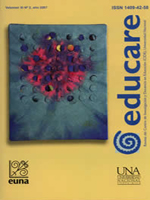Algunas reflexiones en torno al estilo de aprendizaje empleado por estudiantes universitarios
DOI:
https://doi.org/10.15359/ree.11-2.4Keywords:
university students, levels of knowledgeAbstract
This article is about an investigation carried out twenty university students of the career of the Teaching of Spanish of the National University.
The main objective is to know the learning style used by each one of those and the students, and to carry out an analysis of the levels of knowledge (cognitive, affection-attitude and psychometric), the activities used by means of the use of action verbs and of state and the used teaching techniques.
The learning of those and the students have been approached by the specialists of the education from different perspectives. Some of them, they have put their look to the internal of the classroom, highlighting methodology aspects, of strategies, of study habits, self-esteem, flaws in the pedagogic formation of the educating ones and recently he/she has put on emphasis in the form in that the students learn, concretely, the learning styles that each person possesses to assimilate the knowledge.
Howard Gardner it has treated the topic of the multiple intelligence, one this linked with the potentialities that each human being to learn. Others specialists of the education, on the contrary, they have referred to aspects related with the social part, politics and economic that influences in an indirect, but emphatic way, in the teaching processes and learning.
A brief position is made from the theoretical perspective supported in the opinions of some university investigators and a foundation in the classroom for the practice that is closely related with the main discoveries of this investigation.
References
Binkley et al. (2004). Ayudando a los niños a triunfar en la escuela. Estilos de aprendizaje, de http://www. urbanext. uiuc. edu/succeed _ sp/index.html.
Brockbank, A. (2002). Aprendizaje reflexivo en la educación superior. Capítulo III. Madrid: MORATA.
Cuevas Molina, Rafael. (2004). Tambor, de http://www.una.ac.cr.html.
Gardner, H. 2006. Inteligencias múltiples, de http://www.wikileamig.com.wikilearning.com/gardner
_inteligencias _multiples-wkc-12259 .htm -
La Palma, F. (2004). Inteligencias múltiples, de http://www.aldeae.net/aldeae/aldea/tareas2.
Morales, G. (2004). En http://www.una.ac.cr. www.fcs.una.ac.cr/fcs/documentos/
sociedad%20posible%20en%20America%20Latina.pdf.
Nowalski, J. (2003). Asimetrías económicas, sociales y políticas en Costa Rica: hacia una calidad de vida digna. San José, Costa Rica.
Ortiz, Terry. (2004). Los maestros asumen un nuevo papel en el salón de clase, de http://www.sedl.org/pubs/family91/3a.html.
Solano, A. (2004). En: Opiniones Tambor. www.elacvirtual.net/documents/conferencias
-elac/III -conferencia/libro -intro.
Valverde, H. (2004). En: Tambor Opiniones, de http://www.una.ac.cr.
Published
How to Cite
Issue
Section
License
1. In case the submitted paper is accepted for publication, the author(s) FREELY, COSTLESS, EXCLUSIVELY AND FOR AN INDEFINITE TERM transfer copyrights and patrimonial rights to Universidad Nacional (UNA, Costa Rica). For more details check the Originality Statement and Copyright Transfer Agreement
2. REUTILIZATION RIGHTS: UNA authorizes authors to use, for any purpose (among them selfarchiving or autoarchiving) and to publish in the Internet in any electronic site, the paper´'s final version, both approved and published (post print), as long as it is done with a non commercial purpose, does not generate derivates without previous consentment and recognizes both publisher's name and authorship.
3. The submission and possible publication of the paper in the Educare Electronic Journal is ruled by the Journal’s editorial policies, the institutional rules of Universidad Nacional and the laws of the Republic of Costa Rica. Additionally, any possible difference of opinion or future dispute shall be settled in accordance with the mechanisms of Alternative Dispute Resolution and the Costa Rican Jurisdiction.
4. In all cases, it is understood that the opinions issued are those of the authors and do not necessarily reflect the position and opinion of Educare, CIDE or Universidad Nacional, Costa Rica. It is also understood that, in the exercise of academic freedom, the authors have carried out a rogorous scientific-academic process of research, reflection and argumentation thar lays within the thematic scope of interest of the Journal.
5. The papers published by Educare Electronic Journal use a Creative Commons License:














 The articles published by Educare Electronic Journal can be shared with a Creative Commons License:
The articles published by Educare Electronic Journal can be shared with a Creative Commons License: 



